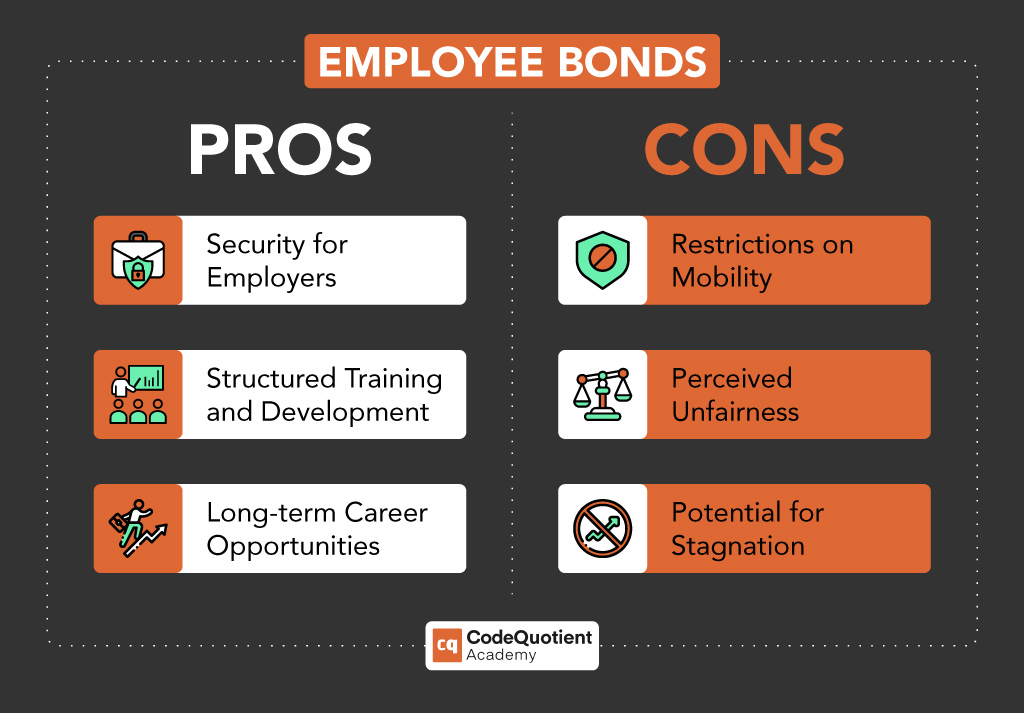I’m often directly confronted with the stark realities of talent retention in the tech sector.
A staggering 77% of global employers face difficulties filling roles, primarily due to a pervasive skills shortage.
This has pushed companies to adopt innovative retention strategies, especially in tech sectors where specific skills are crucial.
In this context, employee bonds have become a prominent approach to resolving this issue. Employee bonds tie graduates to their first employer for a set period. While on the surface, these bonds appear to offer stability and growth opportunities for freshers in tech, they also ignite a contentious debate:
Do they offer a fair start for tech careers, or do they border on exploitation?
Understanding Employee Bonds: A First-Hand Perspective
Employee bonds often stipulate that the employee will remain with the company for a predetermined period in exchange for certain benefits, such as specialised training or unique learning opportunities.
From my perspective, these bonds are a way for companies to safeguard their investments in employee development. We invest significant resources in nurturing the skills of our team, and naturally, there’s an expectation of retaining that talent for a meaningful period.
However, I’ve also noticed that fresh graduates often have ambivalent feelings towards these bonds. On the one hand, these bonds offer them a secure job and a platform for invaluable experience, which is crucial at the start of one’s career.
On the flip side, these bonds can sometimes be perceived as limiting their career mobility. The concern of being “tied down” to one organisation and potentially missing out on other opportunities is real.
Pros and Cons of Employee Bonds

Pros
I’ve witnessed firsthand the advantages of employee bonds in our industry. Let me share the top three benefits as I see them:
- Security for Employers: These bonds safeguard our investment in training. They provide a sense of security, ensuring we have a skilled workforce to navigate technological advancements.
- Structured Training and Development: For newcomers in their career journey, these bonds are a gateway to organised and extensive training. This not only boosts their skill set but also prepares them for challenging roles ahead.
- Long-term Career Opportunities: Employees engaged through bonds often have access to growth and development prospects over the long term, an opportunity that might be scarce in a transient job market.
Cons
I recognise the drawbacks from an employee’s perspective, but these cons only become cons when the company takes it to an extreme:
- Restrictions on Mobility: These bonds can limit employees’ opportunities to venture outside the company.
- Perceived Unfairness: Among fresh graduates, there’s a notion that these bonds are restrictive, limiting their freedom to explore varied options in the initial stages of their careers.
- Potential for Stagnation: Limited exposure to diverse work cultures and environments might lead to a plateau in professional development.
As said before, employee bonds are only exploitative when companies take them to an extreme. But in my opinion I mostly find them to be highly advantageous both for employees and employers.
When Are Employee Bonds Fair, and When Do They Border on Exploitation?
From my vantage point, the primary intent behind these bonds is to safeguard a company’s investment in its staff’s extensive training and development.
This is especially true in sectors like ours – the tech industry – where substantial resources are allocated for training fresh talent, with an expectation of reciprocation over time.
However, I’ve observed that the distinction between what is fair and what could be exploitative often becomes murky. An employee bond crosses into the realm of exploitation when it imposes harsh financial penalties, stifles an individual’s career progression, or, in extreme cases, creates an environment resembling forced labour.
For many fresh graduates who are naturally inclined to explore diverse career avenues, such restrictive bonds can transform from a professional commitment into an overwhelming constraint.
The Balance Between Company Needs and Employee Rights
A fair employee bond, from my perspective, respects the company’s need to protect its investment in training while also acknowledging the employee’s right to career progression.
I believe that the bond duration should be commensurate with the actual time and resources invested in an employee’s training. This period needs to be reasonable – neither too short that it fails to give the company its due return nor too long that it becomes a barrier to the employee’s future career moves.
Regarding the financial implications, if any, associated with breaking the bond, it’s pivotal that these are not prohibitively high. Excessive financial penalties can unfairly hinder an employee’s career growth and create a sense of being trapped, which is counterproductive for both the employee and the company.
From an employee’s standpoint, I always advise young professionals to approach these bonds with a clear and informed mind. It’s essential to understand fully what you’re committing to – evaluate the training, the experiences, and the opportunities the company is offering and weigh them against the duration and terms of the bond.
Final Thoughts
In conclusion, I advocate for a balanced approach where employee bonds are structured to become a win-win for both the company and the employees, fostering an environment of growth, trust, and mutual respect.
Employee bonds, when structured with transparency and fairness, can effectively balance the company’s investment and the employee’s career autonomy.
It’s crucial that these agreements clearly outline both expectations and consequences. This can foster a culture of informed consent and mutual respect.




